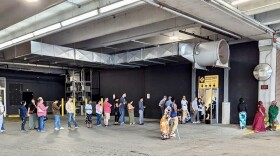If John Benningfield didn't make a change, he’s pretty sure he would have died. He spent his teens, well into his 30s in and out of Clark County jail, mostly on drug charges.
He’d burned his bridges and was homeless. At that point, jail was comfortable; a “vacation from life.” He got food and shelter in jail, and it’s where his friends were.
“It was a place where I could get healthy and just to go back out and do it all over again, this vicious cycle,” he said of his drug use. “I didn't have a place to go, so [the] only place I knew to go was back to the same old people, places and things, which wound me right back in jail.”
Benningfield was in Clark County Judge Brad Jacobs’ court a lot for his charges. And in one instance, Jacobs gave him the choice to go to a sober living house rather than serve jail time.
Benningfield said he wouldn’t have gone on his own, and wouldn’t have been able to get treatment otherwise. It changed his life. So did learning less than a year later that he had a daughter.
He started working through Clark County Family Recovery Court where he said he felt a lot of support. It’s a problem-solving court that helps people and families impacted by addiction. He credits this program with helping him get custody of his daughter.
Benningfield celebrated six years of sobriety Thursday.
Since he started recovery, he’s worked with LifeSpring Health Systems on Project CARE. The effort partners with local police agencies to get people access to treatment resources after an overdose. He’s currently a forensic manager with Thrive RCO and oversees the Integrated Reentry and Correctional Support program, which helps people prepare and reacclimate when they’re released from custody.
His is the kind of success grassroots coalition Clark County CARES works for. It’s part of what they’ll celebrate at a 10th anniversary event next week.
The group started in response to rising drug use and deaths sweeping the area. It’s made up of community members, judges, doctors, service providers, people in the recovery community.
Founding member Carolyn King calls it a proactive group of people who want to make a difference in the community.
“Anybody who says ‘I really care about this issue’ is welcome,” she said.
A community unites
Southern Indiana, like much of the surrounding areas, got hit hard by the opioid crisis. King was a social worker who had worked in neighboring Scott County. In March 2015, her granddaughter died from an overdose.
Friend and cofounder Barb Anderson, also a social worker, lost her nephew to addiction.
The two saw how substance use disorder cut through families, dealing blow after blow to the community.
“It was everywhere, and nobody knew how it got here, nobody understood how it got here,” Anderson said. “And they were all shaking their heads and wondering, ‘what do we do? How do we deal with this?’”
Clark County CARES advocates for resources and programming to help prevent deaths and get people into recovery. It’s not a nonprofit, and it doesn’t provide direct service, like a treatment center would. Anderson said the point is connecting real people with other real people.
“It ties people together and in a way that it's powerful, simply because it identifies the need and says, ‘this is who needs the help. And here are the helpers, and let's talk together to find out how we can best get them served,’” she said.
King said there’s strength in operating as a community coalition.
“Coalitions have their own grassroots effort,” she said. “We're not competing for money with any other provider here.”
Clark County Health Officer Dr. Eric Yazel said the group’s work has made a powerful impact at the state level. He said it’s a showing of force that tells people who fund recovery work that the money will be used wisely.
Yazel is a member of Clark County CARES. He’s also called on the group to help support efforts in the area. He said they’ve been instrumental in supporting the ongoing operations of things like the Clark County Syringe Services Program, which has to get local re-approval every two years. There, people who use intravenous drugs can turn in used needles and get clean ones, and get access to health screenings and resources for treatment.
Clark County CARES has also amplified the Clark County Health Department’s efforts to secure state funding for other prevention efforts, like the PulsePoint app that alerts people to help if there is an unconscious person nearby, and a vending machine that dispenses free Naloxone outside of Norton Clark Hospital.
Yazel said the efforts the group has been part of have led to a 40% drop in overdoses, which went up when programming was shuttered during the COVID-19 pandemic. He said they’ve declined since.
“They really are involved in one way or another in supporting everything related to substance use disorder,” he said. “There just really isn't much in terms of programming or initiatives in our area that you know hasn't been touched by them in some way.”
Evolution and learning best practices
Group members pay attention to what's working in other areas. A few years ago, Clark County CARES traveled to Huntington, West Virginia. It had also been hit hard by opioid use, and Southern Indiana advocates wanted to learn how they were handling things.
They brought back ideas for new local programs, like Project CARE, a partnership with LifeSpring and police departments, and a new problem-solving court to help people get resources and treatment.
Judge Jacobs, who sent Benningfield to sober living instead of jail, is also part of Clark County CARES.
Jacobs’ decision to offer the sober living option over time in custody came as he was learning about more proactive approaches to criminal justice, like treatment instead of incarceration when appropriate.
“If we had NOT been working together with Clark County CARES, I would NOT have been comfortable trying something different,” he said in a text message. “And that’s still happening. I encounter new people and programs and approaches all the time through Clark County CARES and there’s never a shortage of people needing that help.”
Benningfield now works with Clark County CARES whenever he can. He got involved after being invited to speak on a panel at Drug Facts Week, their annual flagship event. He said what they have is unique and tremendously helpful to people stuck in addiction. It’s a partnership not seen in other communities.
There’s a Clark County CARES 10th anniversary event Monday from 5:30 to 7:30 p.m. at St. Paul’s Episcopal Church in Jeffersonville. It’s free and open to the public.
It honors what the group has done and what each individual participant has achieved.
Coverage of Southern Indiana is funded, in part, by Samtec Inc., the Hazel & Walter T. Bales Foundation, and the Caesars Foundation of Floyd County.






